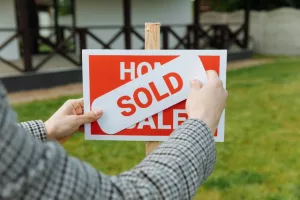3 Examples Of IoT (“Internet of Things”) In Real Estate
Go Back To Previous PageAccordingly, the Internet of Things (IoT) is a computer term describing an ecosystem of modern technological devices linked together via Internet connectivity. These devices use sensors, software, and other technologies that will make communication possible. Due to that, once ordinary physical things become more intelligent, impressive results that enhance convenience and modify the way of living are produced. We invented IoT more than 20 years ago, but it has not been applied to the real estate industry. However, now people utilize it t, its significance and usability in the real estate sector are more significant than ever. The Internet of Things refers to homes and workplaces, improving the industry immensely. IoT is a game-changer.
What makes this intelligent technology essential in the real estate division? What are the specific examples of IoT used in this sector? Know the answers to those as you keep reading below.
What is IoT (“the Internet of Things”) And Its Relevance In Real Estate
Real estate involves raw materials such as cement, steel, and concrete; IoT offers massive help. To seek more information, check widesky.cloud or any related topic. It hopes to help consumers live a conducive life and maximize connected devices while saving time and money.
The rise of smart real estate is now visible in most residential areas, malls, offices, and even parking lots. If you haven’t noticed it, use parking space technology as an example. They use sensors to identify if a car is occupying a specific space. Thus keeping you away from the hassle of roaming around the area for minutes to find a vacant space.
space technology as an example. They use sensors to identify if a car is occupying a specific space. Thus keeping you away from the hassle of roaming around the area for minutes to find a vacant space.
Benefits Of IoT (“the Internet of Things”) In Real Estate With Examples
IoT is rapidly changing our way of living and producing beneficial consumer results. Indeed, it is helping the real estate industry improve in many ways, and you can look at how it is utilized.
Below are some examples of the rapidly growing IoT applications in this field:
-
Energy Efficiency And Utilization
One common desire for businesses and homes is to save and be efficient with energy. Energy-saving technologies are beneficial, especially given how expensive the world is now.
Smart real estate technology, such as the following, will help you reach your goal of being efficient with energy use:
- The Heating, Ventilation, and Air Conditioning (HVAC) System is sensitive to ambient temperature, so it controls the thermostat according to the ideal temperature. It also monitors and analyzes data like the tenant’s schedule, where the HVAC System automatically turns on and off depending on the regularity of use. This ensures that no energy is wasted.
- A smart lighting system is another way to help you save energy. It has motion sensors that respond when somebody or something triggers the motion sensor. Some motion sensors are called occupancy sensors, such as smart bulbs, which automatically turn off in unoccupied spaces. There is also a Wi-Fi-enabled lighting system that someone can turn on and off according to schedule or as needed to clear excessive energy use.
-
Optimized Security
Security is one of the most important reasons people consider IoT in their homes and workplaces, and nothing is more vital than one’s safety. With the help of the intelligent real estate market, cameras, motion sensors, and facial recognition technology work together to keep you and your property safe and at peace.
To enhance this setup further, it’s essential to understand the different types of security cameras available and their specific use cases. Thus, security measures will be even tighter.
Security improved in the field of real estate through the following technologies:
- 24-hour surveillance cameras enable reliable AI algorithms and machine learning for close monitoring even without human monitoring. You can now place cameras can now
 in far-flung areas, unlike before. With the help of wireless communication technologies, you will always have confidence and peace of mind when you know that every corner of your area is visible through the eyes of a camera. Thus making security measures even tighter.
in far-flung areas, unlike before. With the help of wireless communication technologies, you will always have confidence and peace of mind when you know that every corner of your area is visible through the eyes of a camera. Thus making security measures even tighter. - Facial Recognition System (FRC) or biometric technology is an innovative real estate technology that matches human faces from an archive of digital images containing the homeowners’ or employees’ database for ID verification. Thus, face recognition technology prohibits unauthorized entry.
-
Giving Intensive Attention To Health Protocols
No one is allowed not to be careful, especially during this pandemic season. The government encourages following the social distancing mandate due to the possible transmission of the virus through object contamination. Touching publicly used items such as door handles and elevator buttons is prohibited.
That’s why people use touchless devices and Autobots to make things accessible and convenient, but still very safe amidst the pandemic. The following are examples of how smart real estate is beneficial when it comes to health security:
- Doors are now built with sensors that automatically open when they detect an object in real time or a person aiming to pass through.
- QR Codes and GPS are also maximized in malls and workplace modes of entry to speed up contact tracing, which helps prevent any possible outbreak.
Conclusion:
IoT is indeed improving the real estate industry in ways that surprise everyone, and its benefits for every homeowner and business owner are genuinely beneficial. The conventional method of living is now made smarter with modern technological devices integrated for smart communication and data exchange.
Data transfer and analysis are maximized and utilized to produce excellent results.
With IoT, you can expect energy savings, optimized security, and health safety. This also increases the value of your property if you plan on selling or leasing it out. Who wouldn’t prefer a more competitive and convenient space?
Understanding the relevance of IoT and grasping how it’s applied in the real estate arena will give you a leg up on your competitors while living life more smartly and conveniently.
Author Bio: Gregory F. Burnett
Gregory F. Burnett is a real estate specialist. He’s researching the expansion and improvement of the real estate industry and seeks to share this expertise through his blogs and articles. In his free time, he loves to drive around the park and meet new people.


